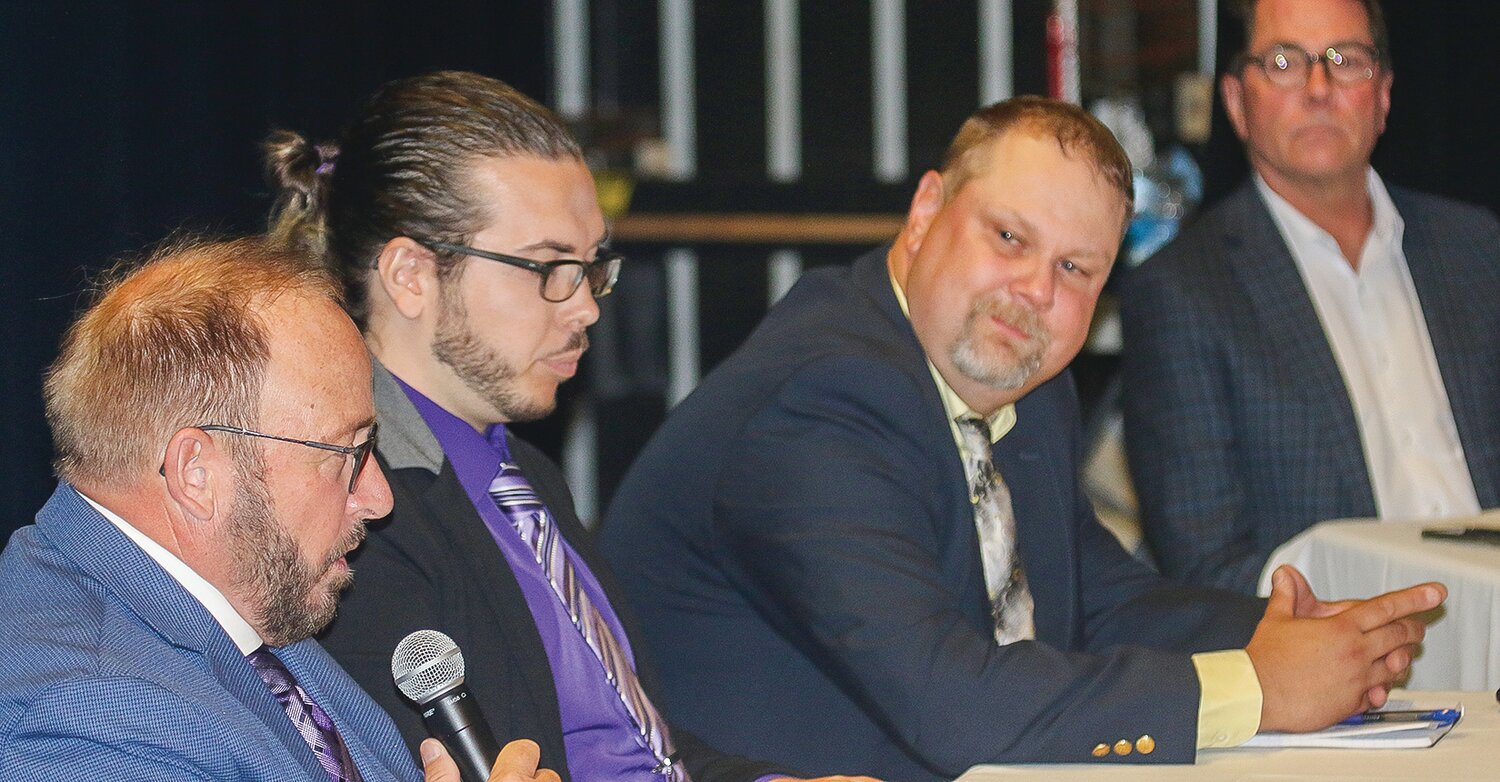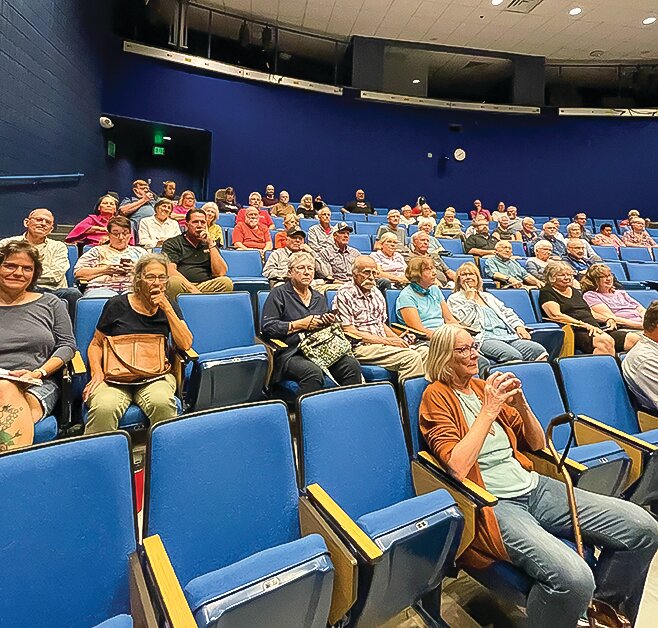Support the Timberjay by making a donation.
Speaking of politics
House candidates face questions at Ely forum
ELY— The three candidates for the District 3A seat currently held by Roger Skraba faced questions here for 90 minutes Tuesday night, ranging from the disposition of school trust lands in the …
This item is available in full to subscribers.
Attention subscribers
To continue reading, you will need to either log in to your subscriber account, below, or purchase a new subscription.
Please log in to continue |
Speaking of politics
House candidates face questions at Ely forum
ELY— The three candidates for the District 3A seat currently held by Roger Skraba faced questions here for 90 minutes Tuesday night, ranging from the disposition of school trust lands in the BWCAW to abortion rights to gun safety.
The candidate forum, sponsored by the American Association of University Women and Ely Rotary, featured former Ely Mayor and first-term Rep. Roger Skraba, International Falls Mayor Harley Droba, and Independent candidate Rich Tru, of Two Harbors.
Moderator Joe Weise told the roughly 60 people in attendance that the event was not intended as a debate and the candidates fielded differing questions in a series of rounds, with each given 90 seconds for initial answers of their questions and an additional 30 seconds to address any of the questions from each round.
Skraba, who served three terms on the Ely council and was elected four times as mayor, needed no introduction to the Ely crowd. Skraba, who has run for office previously as a DFLer, an Independent, and now a Republican, touted his willingness to reach across party lines in the Legislature and noted that he was one of only a handful of Republican lawmakers to vote for some major DFL initiatives, including the bonding bill and an environment bill, noting that both had benefits for northern Minnesota. “I’m someone who will vote for my people, not the party,” said Skraba, who noted that he has a relatively low 68 percent rating from the Conservative Political Action Committee.
Droba touted his success as mayor of his border city, the largest in District 3A, noting that he assumed the city’s top job just as the COVID-19 pandemic took hold. “We used that as an opportunity,” he said, to attract new development to the community. He said he helped bring two hotels, a new grocery store, two new convenience stores and the first new apartment complex in the Falls in half a century.
Droba said he’s focused on affordable housing along with improving health care access and ensuring the survival of local ambulance services. He noted that his 18-year-old daughter was born in International Falls, but that none of the hospitals in District 3A currently provide OB/GYN services. “And we don’t have easy access to dentists or optometry care,” he added. Droba criticized Skraba for not responding to his community’s request for help in addressing ambulance concerns.
Skraba noted that District 3A is enormous geographically, larger in fact than nine states, and that covering every issue can be close to impossible.
Tru, who grew up in Two Harbors, told the audience that his independence from the two major parties would allow him to pursue policies based on their merits, rather than on the dictates of party leaders. Tru, the youngest candidate in the race, has had multiple career paths, working at various times as a union member in California, as a sommelier at a high end restaurant, and more recently as a digital media project manager.
Tru said believes he could be effective as an independent because he could work across the aisle without interference from party leaders. “I think a lot of my ideas would be a breath of fresh air down there [in St. Paul],” he said.
Tru, who acknowledged he suffers from attention deficit disorder, talked about how restrictions on immigration was impacting the ability of citizens with mental health issues to access some of the medication they need. Tru is also a strong advocate for ranked choice voting, which he believes will help to break up the two-party duopoly that currently dominates American politics.
The candidates found some areas of agreement, including on the need to expand the region’s base of affordable housing. “Everyone is having trouble with housing,” said Skraba. “I believe that’s the number one issue in every community where I’ve door-knocked.” Skraba said he’s working on a housing project in Grand Marais with assistance from the Department of Iron Range Resources and Rehabilitation and noted that finding developers willing to invest in the region is a major challenge.
Droba agreed that affordable housing is a key need but he noted that some portions of District 3A, such as International Falls, are not within the coverage area of the IRRR and so must rely on legislative action to bring state housing dollars to their communities.
Both Droba and Tru agreed that ambulance care should be considered an essential service, which would open up opportunities for some state funding assistance. Currently, many local ambulance services are operating at a deficit. The Legislature did provide $30 million in one-time funding during the 2024 session to address some of the shortfalls, but the candidates agreed that more needs to be done to provide a long-term source of additional revenue, preferably from an increase in federal reimbursements from Medicare and Medicaid.
The candidates seemed to largely agree as well on the subject of human rights, even as Skraba was questioned over his opposition to putting an equal rights amendment, or ERA, on the Minnesota ballot this November. Skraba said he opposed the measure because it was too focused on transgender rights and did not protect the elderly against age discrimination. He said efforts by Republicans to offer amendments were blocked by the DFL majority in the House. But Skraba later sounded supportive of DFL efforts to protect the rights of the LGBTQ community from discrimination, saying he believes the protections offered in the most recent session are adequate. “The Democrats had a majority and I think they did a pretty good job of tightening up that language,” he said. “People are different, accept their differences and move on.”
Droba said he believes that people need to be able to live their lives as they wish to pursue them. “That’s why I support the ERA,” he said.
Droba took issue with Skraba for his ambiguity on some issues, particularly on reproductive freedom. “I think everyone has the right to make decisions for their own body,” said Droba, noting that Skraba voted against reproductive rights in the Legislature.
“I struggle when I see one thing on his website and hear something else when he speaks on the subject,” said Droba. Skraba’s campaign website highlights that ambiguity, in that it states that “life begins at conception” and that “women know what’s best for them,” seemingly using language from both sides of the abortion debate.
Droba and Skraba differed on how to address the school trust lands in the Boundary Waters. Droba said he supported a sale of the land to the U.S. Forest Service, but argued that the state should seek more money for the land than what is currently being discussed. Skraba said he believes the land should be exchanged for federal lands outside the wilderness, which could be used for mining, logging, and recreation under the control of the DNR.
On the economy, Droba said the region needs to improve its readiness for new jobs by focusing on improving education, housing, and health care, which he called “the three legs of the stool” for a healthy economy.
Tru said he supports a higher minimum wage, of about $14-$15/hour and opposes a lower minimum wage for people under age 18, which he said has been abused in some states. He said had the minimum wage been indexed to inflation from its inception, it would currently be $33-$35/hour. He called for more support for union jobs and also the promotion of co-ops.
Skraba said exchanging school trust lands in the BWCAW would create more opportunity for growth in area communities.
When questioned about the controversy over the Silver Rapids development, both Skraba and Droba said local governments should have rules in place to guide development and should be allowed to implement those rules with minimal state interference. “It’s a local issue,” said Skraba.
Tru took a different tack. “Corporations are corporations,” he said. “They’re not people. It’s government’s role to protect the people.”
On climate change, Tru said we’ll all have to get used to living with a new climate regime and called for more partnership between the federal and state governments to address the many related issues encompassed around climate change. “We need more forward thinking to future proof ourselves,” he said.
Skraba said he was opposed to the renewable energy standard approved by the Legislature last year, which requires carbon neutrality in the state’s electricity production by 2040. Skraba said renewable sources of power, like wind and solar, don’t have the ability to meet the state’s electric power needs and won’t anytime soon. “The 2040 standard was not the way to go,” he said. “I’m not opposed to phasing out fossil fuels, it just needs to be done in a way that’s viable.”
For more on the candidates, you can visit their websites at:
Roger Skraba: skrabaforhouse.com
Harley Droba: harleydroba.com
Rich Tru: home.forwardparty.com/richtru









